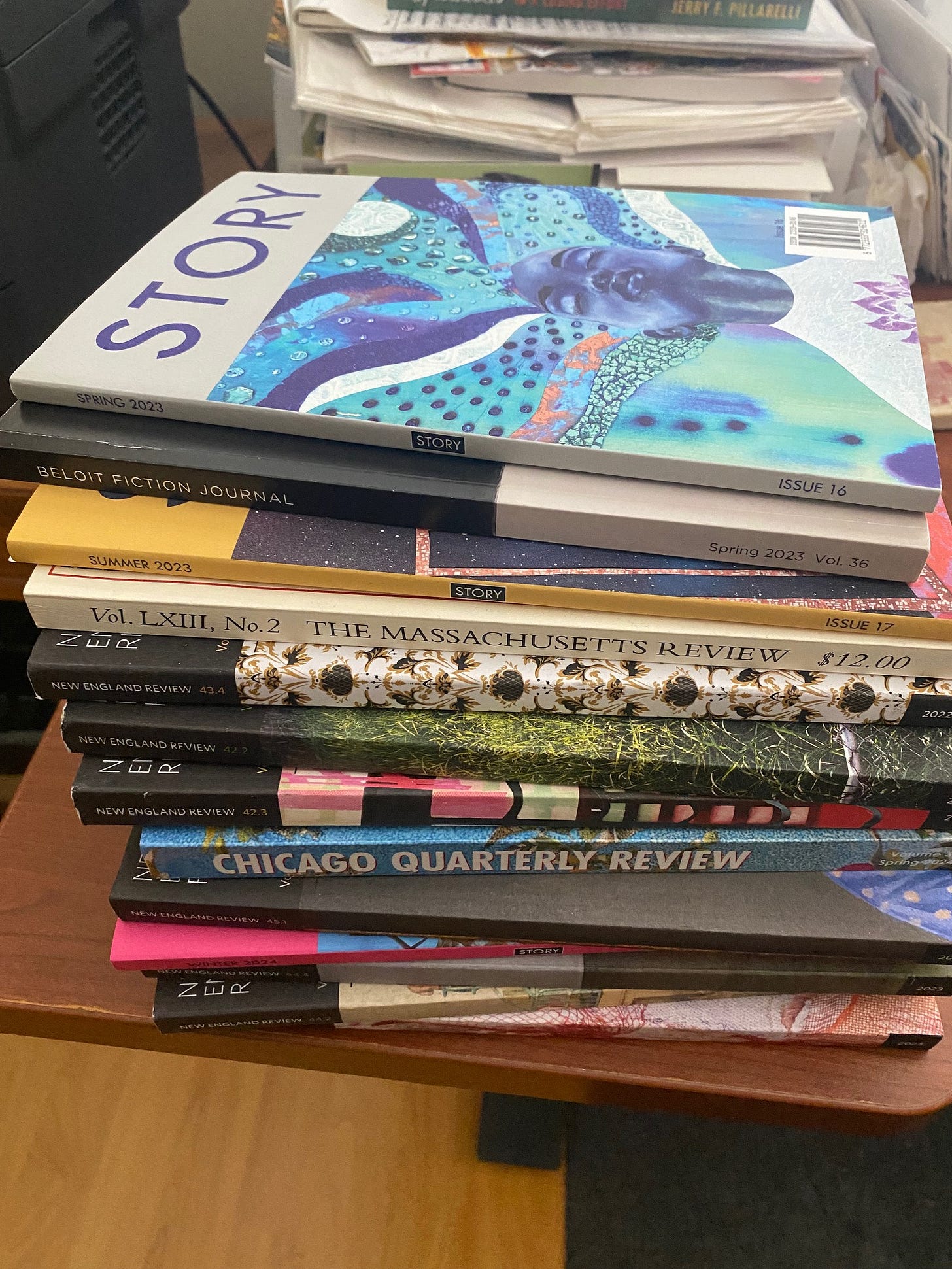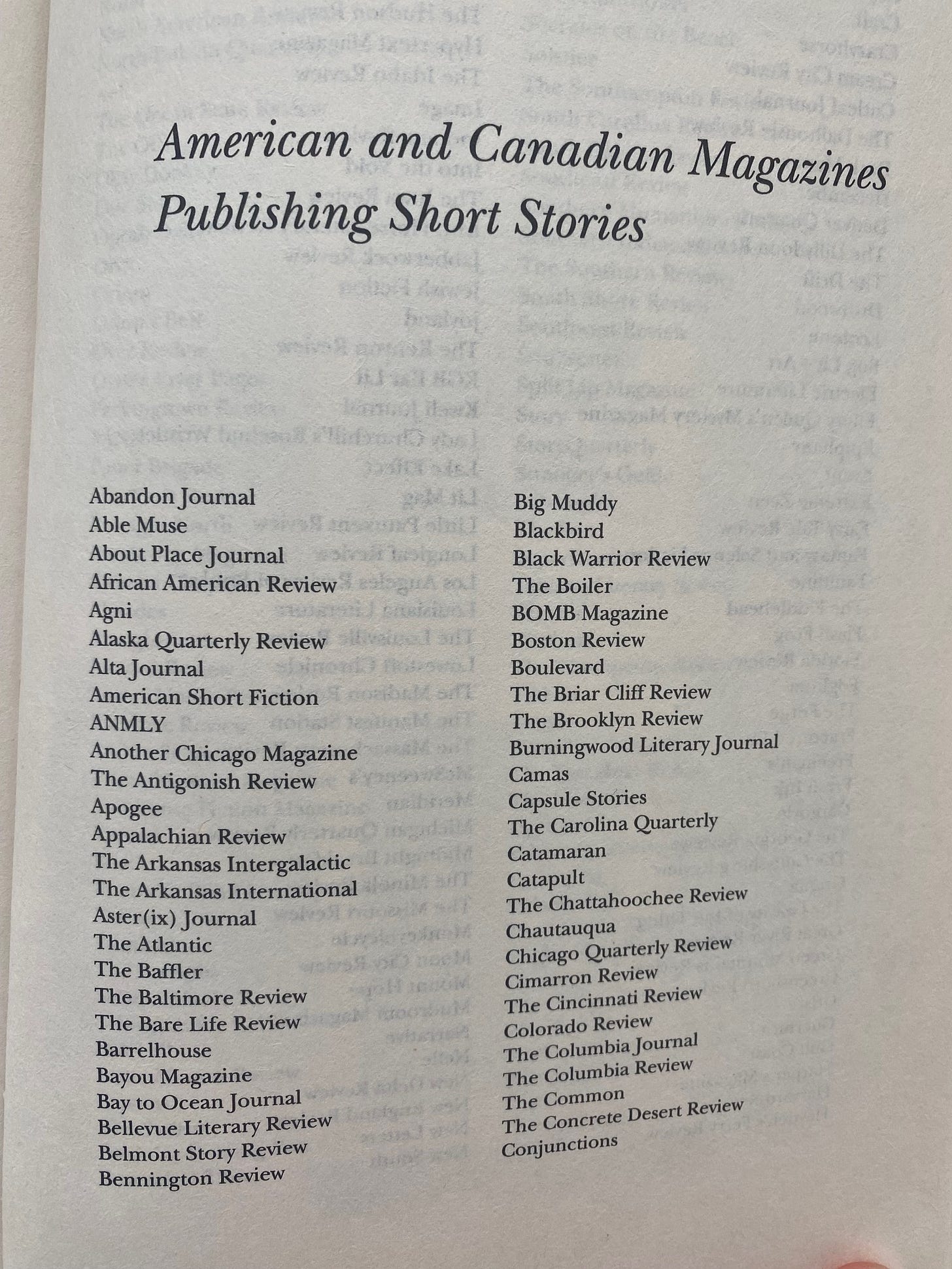A How-To for Submitting Your Work for Publication
⭐️ Literary journal submissions 📗
Yearly and monthly subscriptions are currently 30% off. A preview of the most recent agent list can be accessed here.
Whenever I teach a writing workshop, students always ask the following question: Where should I submit this story [poem, flash piece, essay]? Today’s post provides a detailed compendium of the advice I share with them.
The best initial tack to take in order to find the most likely candidate to publish your work (also the most rewarding and labor-intensive): read and subscribe to at least a few literary journals and related literary publications—or ask your local library to subscribe if you’re unable to. By reading these periodicals, you’ll discover which ones publish prose and poetry stylistically and/or tonally similar to your own.
Some recommendations, in no specific order: New England Review, Story, Rain Taxi, Catamaran Literary Reader, Poets & Writers, ZYZZYVA, Boulevard, Swamp Pink, New Ohio Review, The Missouri Review, Ploughshares, Chicago Quarterly Review, South Dakota Review, Laurel Review, Massachusetts Review, The Cincinnati Review, Electric Literature, LitMag, The Rumpus, TriQuarterly Online, The Southern Review, Memorious, and Greensboro Review.
Most print journals publish portions of their issues online, and more and more journals are now entirely online, all their prose and poetry accessible—subscription often required.
Along with Duotrope, which, for a fee, offers various writing-related resources, a student recently told me about a site with a comprehensive and frequently updated (and free) list of journals, Chill Subs. It helpfully notes which magazines are currently open for submissions.

I’ve also used Submittable’s “Discover” tab to find journals with open submission periods. Submittable organizes them in order of urgency, i.e. the journals soon closing are the first ones listed.
Submittable is used by scores of book publishers, periodicals, and arts organizations as their online submission conduit. (A predecessor, Submission Manager, was one of the earliest online systems “for accepting and managing written submissions for magazines and presses.”)

I also suggest students read at least a couple of the annual anthologies, The Best American Short Stories, The Best American Essays, etc., O. Henry Prize Stories, Best Small Fictions, and Pushcart Prize anthologies. Look in the back where the names of the many literary journals that submit to these series’ editors can be found.
One final note: I counsel students to submit only to the journals they really do want to be published by. Sometimes a former student will send me an email asking for advice after receiving an acceptance from a journal it turns out they don’t really want to be published in. Should they turn down this acceptance and wait for a more prestigious or better known journal to offer publication?
No. They should graciously accept the offer and submit more strategically (and kindly) next time. It isn’t ethical to waste editors’ time if you don’t truly want to be in their periodical. Most journals are labors of love, and their editors aren’t earning a dime for their work.
I understand the impatience for publication—who hasn’t at some point been driven by that particular demon? But there’s never a good enough reason to rush, and whether we chafe at it or not, the writing life rewards the long view.
In other essays I’ve published here, I’ve mentioned how long it took me to place some of my stories. I submitted to Ploughshares for more than a decade before they accepted a story, “The Prettiest Girls,” in 2011. I sent work to New England Review for 7 or 8 years before they published “This Parrot Is Hilarious” in 2002.
I’ve been fruitlessly submitting to some journals for more than 20 years and probably will continue to submit to them from time to time. (Steve Almond’s “A writer’s job is to outlast doubt” again comes to mind.)
Aim for the best journals. Read them and write as well as you can. As Roland Flint tells us in his poem “Late September, Early Morning,” “The work is all.”
**
URLs with lists of journals accepting fiction (flash fiction & traditional short stories in most cases):
https://internationalwriterscollective.com/great-places-to-submit-flash-fiction/
https://thejohnfox.com/flash-fiction-submissions/
https://www.tckpublishing.com/get-paid-to-write-flash-fiction/




Thanks! I didn't know about Submittable Discover tab, and your list of publications is very useful. But more than these even, it's your encouragement. There are months I simply give up and don't submit anything. Knowing that it took an author like yourself a decade to get published in Ploughshares, makes me think I should retry.... Thanks, as always....
Excellent post, Christine! I agree with your advice to only submit to journals you really want to be published in. I'm not a fan of the trend of purposely aiming to garner 100 rejections, flooding submission queues everywhere, taking a sort of "numbers game" approach. So much wisdom here. Thank you!